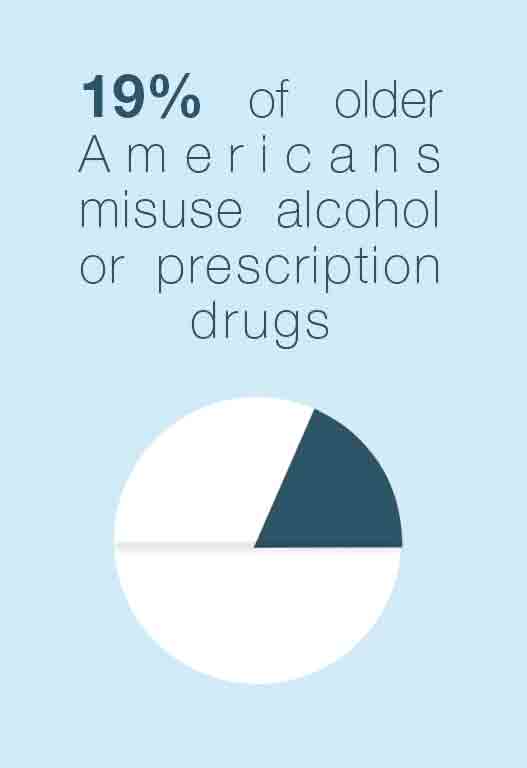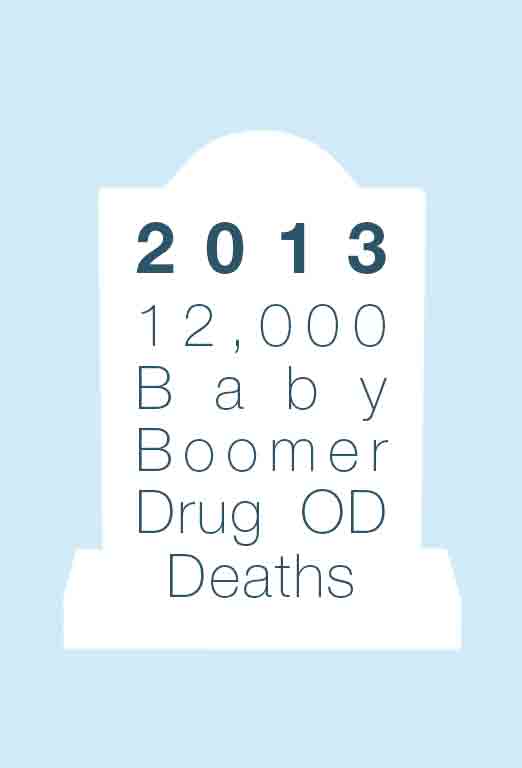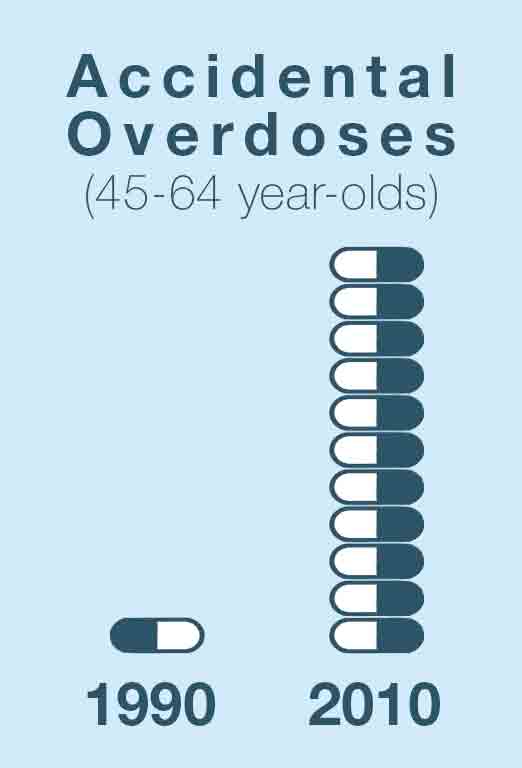When you picture a person binge drinking or taking a lot of painkillers like OxyContin, the first image that pops into your head is not likely to be an individual on the verge of retirement.
Drug and alcohol abuse has almost always been correlated with youthful immaturity, but there’s a new demographic that appears to be more prone to substance abuse than in years’ past: baby boomers drug abuse statistics is increasing.
The 76 million plus baby boomers in America have become just as likely as their children and grandchildren, if not more so, to use illicit drugs, abuse alcohol and misuse prescription medication. The result is an increase in baby boomer substance abuse.
If you or a loved one are experiencing signs of substance abuse, please call 772-774-3872.
Emerging Boomers Drug Addiction Problem
It may be surprising to some that adults over age 50 or baby boomers drug and alcohol abuse rates rival younger generations, but perhaps it shouldn’t. The baby boomer demographic was born in between 1946 and 1964 and had the highest substance abuse rates as teens and young adults among any of the other living generations.[1] Many of these individuals stopped drug use as they reached their late 20s and early 30s, but with their kids mostly out of the house and many entering retirement, boomer drug abuse is up again.



In 1990, the oldest baby boomers began reaching age 45. Since then, a dramatic increase in rates of boomers alcohol and drug abuse has been seen, hospitalizations due to drug and/or alcohol abuse and overdoses. More older adults die from overdoses than influenza or pneumonia, and the rate of accidental overdoses among this generation is higher than that of people between ages 25-44 for the first time in history. The most commonly abused boomers drugs include marijuana, heroin, prescription opioids and alcohol.[6]
Possible Explanations for Increased Baby Boomers Alcohol And Drug Abuse

A combination of multiple factors has led to the surge in baby boomer alcohol and drug abuse. The first is the mindset of this generation and their attitudes about substance abuse. These adults were adolescents and teenagers during the 60s and 70s when many were subscribing to Timothy Leary’s “turn on, tune in, drop out” advice. Growing up in the Woodstock age, an era of youthful rebellion and changing beliefs on boomer drug use, made it so doing drugs and drinking alcohol weren’t viewed as negatively as they are now.
Another factor to consider is the massive increase in chronic pain in the U.S. and the subsequent spike in opioid prescriptions.[7] Americans take more prescription painkillers than any other country.[8],[9]
From 1998 to 2008, the number of people being treated for opioid abuse increased by an astounding 400 percent.
According to the U.S. Census, 92 percent of older adults in America have at least one chronic condition and 41 percent have at least three.
Women of all ages are drinking more often and using more drugs than ever before. This certainly has impacted the rates of overall boomer alcohol and drug abuse. According to an analysis of the National Survey on Drug Use and Health, the rate of binge drinking among older women increased from 6.3 percent to 9.1 percent, and their rate of boomer alcohol abuse and dependency nearly doubled from 2005-2014.[10]
Another explanation for the emergence of the baby boomers drug abuse problem may also be related to the realities of aging. The combination of loneliness, chronic conditions, depression and excess free-time may be leading older adults to abuse drugs and alcohol at higher levels. One in four older adults struggles with mental illness. The total number is expected to reach 15 million by 2030.[11] A Duke University study that surveyed 11,000 people over the age of 50 found a correlation between being separated, divorced or widowed and binge drinking.[12]
“One in four older adults struggles with mental illness.”
Older adults are more likely to have experienced the traumatic loss of a spouse, a close family member or friend and are more likely to have an abundance of free time due to being retired and without any childcare responsibilities. When you combine these factors with the likelihood that many experimented with drugs as teenagers and young adults, the result is a population of vulnerable aging boomers drug user.
Increased Health Risks Associated with Boomer Drug Abuse

People of any age group are at risk of developing numerous health issues as a result of substance abuse. This risk becomes greater with age. The older a person gets, the more difficulty he or she will have processing alcohol. According to Dan Blazer, a Duke University lead researcher who was quoted in USA Today: “On average, if a young person drinks five beers and an older person drinks five beers, the older person is almost certainly going to have more difficulty.”[13]
In addition to processing drugs slower, older adults have a higher risk of incurring injuries through accidents while under the influence of drugs and/or alcohol. Additionally, older adults are already at increased risks for developing heart conditions and other health disorders. Boomers drug abuse will only increase these risks.
Treatment Obstacles for Baby Boomers Drug Abuse
Typically, when a patient enters addiction treatment, horror stories about how substance abuse has ruined lives is enough to make him or her want to change. However, this strategy does not work as well with baby boomers because they grew up in an era that glorified substance abuse. Many of their friends have used marijuana and drank alcohol while seemingly living successful lives. For every story an addiction care expert has about the dangers of boomers drug use, baby boomers have several others about people they know who do boomers drugs regularly and are successful in their professional lives.
Perhaps the largest obstacle for baby boomers in the treatment of substance abuse is misdiagnosis. The signs of alcoholism and drug addiction are often overlooked in older adults because of hurried doctor visits and the fact that symptoms of substance use disorders often mimic symptoms from other medical and behavioral conditions.[14]
Among their friends and family members, baby boomer alcohol and drug abuse problems are also often overlooked. This is because many older adults drink or use drugs in private or because those closest to them may not feel treatment is worth pursuing because of their loved one’s advanced age.
No matter what the age of a person, substance abuse is a potentially fatal problem. If you’ve detected signs of boomer drug abuse, prescription pill misuse and/or excessive drinking in your aging loved one, you must take action immediately. The professional addiction care experts at Behavioral Health Centers have a wealth of experience in treating addictive disorders in patients of all ages. We welcome you to learn more about our services by contacting us at 772-774-3872.
- https://www.wsj.com/articles/how-scientists-compare-drug-use-across-generations-1426468864
- https://www.samhsa.gov/prescription-drug-misuse-abuse/specific-populations
- https://www.ncbi.nlm.nih.gov/pmc/articles/PMC3097242/
- https://www.ncadd.org/about-addiction/seniors/alcohol-drug-dependence-and-seniors
- https://corporate.dukehealth.org/news-listing/survey-reveals-binge-drinking-among-older-adults
- https://www.wsj.com/articles/aging-baby-boomers-bring-drug-habits-into-middle-age-1426469057
- https://www.cdc.gov/mmwr/volumes/65/rr/rr6501e1.htm
- https://www.ncbi.nlm.nih.gov/pmc/articles/PMC4170948/
- https://www.ncoa.org/news/resources-for-reporters/get-the-facts/healthy-aging-facts/
- https://nsduhwebesn.rti.org/respweb/homepage.cfm
- https://www.ncoa.org/news/resources-for-reporters/get-the-facts/healthy-aging-facts/
- https://corporate.dukehealth.org/news-listing/survey-reveals-binge-drinking-among-older-adults
- https://usatoday30.usatoday.com/news/nation/2009-08-17-newbingedrinking_N.htm
- https://www.ncadd.org/about-addiction/seniors/alcohol-drug-dependence-and-seniors







